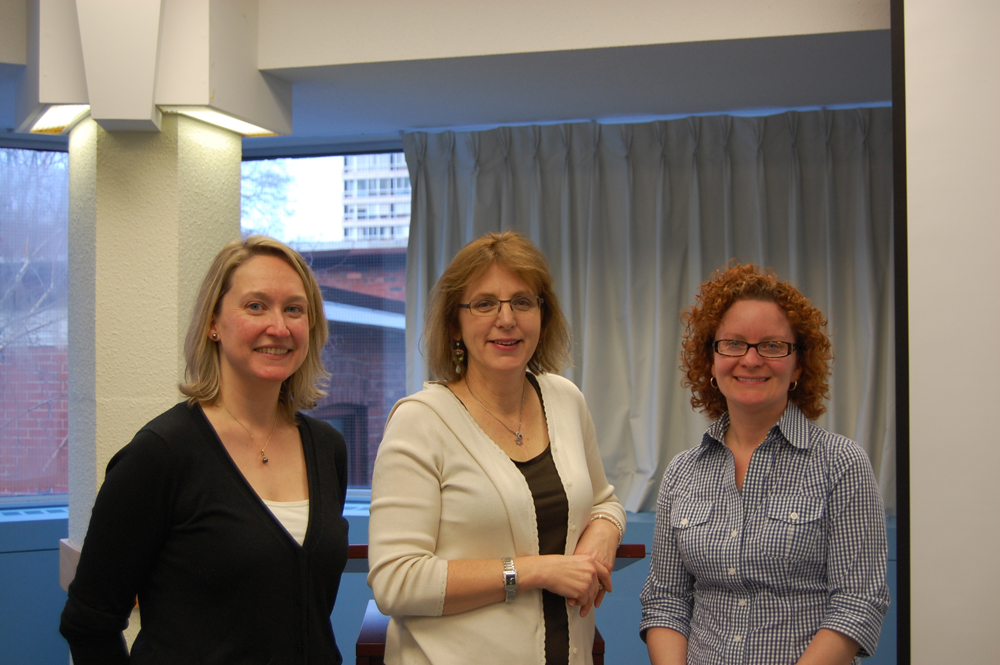Key organizer and moderator of a Canadian Institutes of Health Research (CIHR) Café Scientifique, assistant professor at Bloomberg Nursing, Dr. Robyn Stremler drew quite a crowd for her sleep discussion. The meeting room at Northern District Public Library quickly filled up with interested parents, teens, teachers and nurses who were there for Sleepy, not lazy! Taking a closer look at adolescents’ sleep and health held on Wednesday, April 17, 2013.
Over 80 attendees came eager to understand the sleep needs of teens, the reasons for their growing sleep deficits and how poor sleeping habits affect their wellbeing. Stremler and presenters Dr. Shelly Weiss, staff neurologist at The Hospital for Sick Children and Dr. Colleen Carney,associate professor at Ryerson University shared their insights into what causes teens to lose sleep, and how to set them on the right track for optimal rest.
“My first thought when I hear a teen isn’t sleeping well is “what’s in their bedroom?”” said Weiss who is also an associate professor at the University of Toronto. “Today’s teens are surrounded by electronic gadgets, especially in the bedroom, and this keeps their brain in active mode when they should be winding down for the night.”
Teens, on average, need 8.5-9.5 hours of sleep each and every night and most are not getting their daily requirement. Far from this being a Western phenomenon, teens around the world are getting less and less sleep. Between social pressure, school stress, biological factors such as a natural inclination to sleep later and a higher likelihood of sleep apnea at this age, teens are struggling to accommodate everything going on in their lives. As a result, sleep ranks low in importance, even though the consequences of giving up sleep are extremely high.
Dr. Colleen Carney delved deeper into the effects of lost sleep with teens and relayed some startling facts to the crowd. With one in eight teens suffering from depression the link between that and sleep problems become clearer when 75 per cent of those teens have sleep issues and of those, 69 per cent indicate the insomnia began before the depression.
“For many years, there was a perception that insomnia was a result of depression but research is showing that in many cases, the opposite is true,” said Carney who is also a registered psychologist. “The links are startling but there is a tremendous opportunity to intervene and prevent depression by addressing sleep issues.”
During a short break, attendees spoke one-on-one with the sleep experts and then a lively and informative Q&A session began. Guests had thoughtful questions, mostly in relation to the teenager in their lives and the sleep problems they face, and for over an hour Stremler, Weiss and Carney addressed each of the concerns and comments about adolescent sleep and health.
Stremler had opened the evening by saying that the discussion would “address teen sleep, what does it look like? What are the barriers and the strategies?” Based on the wealth of information presented and the audience engagement, attendees left armed with a number of solutions to help their teens get the sleep they desperately need.
Some tips from the experts*
- Teens who exercise tend to have better sleep but be in touch with your sleep habits – if exercise acts as a stimulant for an individual it is best not to exercise at night;
- If teens have trouble sleeping, they should eliminate caffeinated food or beverages after 4:00 p.m.;
- Alcohol and nicotine (and use of marijuana) may be viewed as sleep aids but actually have negative effects on sleep;
- Evidence suggests that teens are more sensitive to light so something like a gaming device, played at night, can trick their brain into staying awake;
- Teens can’t make up lost sleep by sleeping in on weekends – this only messes with their internal clock and ultimately perpetuates the cycle of sleep deprivation. Quantity of sleep does not replace quality of sleep;
- Teens or university students who give up sleep to study are doing more harm than good since studies show that if you’re sleep deprived, you won’t remember what you studied and performance on tests will decrease;
- Occasional naps, less than two hours and earlier in the day, are perfectly fine for teens. It’s when naps become routine, and are being used for missed night time sleep, that they have a negative effect; and
- There is no quick fix. Teens, and their parents, need to work at building a good sleep routine to ensure the recommended 8.5 to 9.5 hours at night to help control the physical, emotional, behavioural and cognitive consequences of poor sleep.
*All suggestions should be tailored to individual sleep needs, patterns and problems.
View photos from the event on Facebook.
